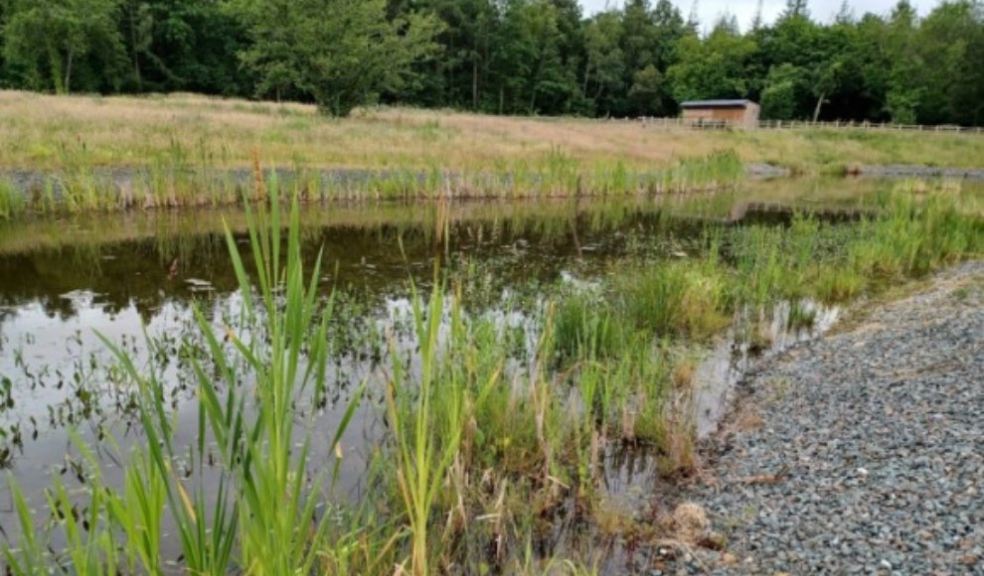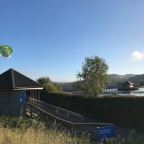
National Highways’ eco drive aims to bring water-lilies back to Devon park
National Highways is playing its part in a bid to bring white water-lilies back to the environmentally significant Stover Country Park sitting alongside the A38 in Devon.
Funding from the company’s Designated Funds programme will help Devon County Council to deliver a major scheme to de-silt Stover Lake within the Local Nature Reserve near Newton Abbot, a Site of Special Scientific Interest.
Working with the local authority, the Stover Country Park team and supply chain partners South West Highways and Kier, National Highways funded a giant reedbed filtration system in 2019 to help improve water quality and enhance biodiversity and wildlife habitats within the park.
The initial scheme was designed to capture and filter water run-off from the A38 and has since brought twofold benefits – not only seeing significant improvements in water quality but also biodiversity and an increase in bird and invertebrate species.
And thanks to National Highways’ investment of £847,762 from its Environment and well being fund, the second phase of environmental and biodiversity work has just started and is due to complete in the summer.
In partnership with Murlac Limited, Devon County Council and the Stover Park team are de-silting the lake to further improve water quality.
It is hoped that by reducing pollution and the silt, white water-lilies – not seen at the lake since 2007 – will re-establish to provide a more diverse habitat for wildlife.
To maintain the sustainable element of the project, Devon County Council will be re-using the dredged silt material to establish a mixed woodland adjacent to the lake.
As part of the funding initiative, National Highways’ investment is also enabling the restoration of the gatehouse at Stover Park, which directly faces the A38 at Heathfield, in addition to £2 million funding from the National Lottery Heritage Fund for further restoration and extension work.
Michelle Reed, National Highways’ Project Manager, said: “We’re investing in the environment and communities surrounding our network, as well as the people travelling and working on it, and we’re pleased to be working with Devon County Council and the Stover Country Park team to further improve water quality and improve biodiversity.
“The earlier filtration scheme has been such a success, and the reed beds themselves are supporting a range of birds, insects, reptiles, amphibians and mammals.
“Our work goes beyond the traditional focus of road investment and beyond operating, maintaining and improving roads, and we’re expecting the de-silting work to bring further benefits to the park and for the many people who visit and use the site.”
Councillor Andrea Davis, Devon County Council Cabinet Member for Climate Change, Environment and Transport, said: “Stover Country Park plays an important role for people's health and wellbeing, but in turn, we also need to care for the health of the park and nature reserve.
“This scheme to de-silt Stover Lake will complement our previous work in partnership with National Highways.
“The sustainable reedbed drainage system that was installed a few years ago has proven extremely effective in improving water quality and restoring biodiversity. This latest investment will build on that success to have a further positive environmental impact at Stover, alongside further restoration work across the country park.”
Pipework and other dredging equipment have now been installed at the Stover Lake site, the work is expected to be completed in July, and Murlac Director Josh Taylor said: “We’re excited to be involved in the restoration works at Stover Lake, and the environmental benefits achieved as a result of the desilting work will be reaped for many years.
“Projects such as Stover Lake are why the entire team at Murlac are passionate about our approach and methodology, as we all understand the importance of caring and maintaining our environment for future generations.
“And by undertaking the cutter suction dredging techniques, the work will be carried out with minimal disturbance to the environment and without the need to drain down the lake."
Up to 2025, National Highways will be investing almost £1 billion (£936 million) from its designated funding programme. This money is allocated to four funding streams focused on making improvements that will make the biggest difference and deliver lasting benefits - Safety and congestion, Innovation and modernisation, Users and communities and Environment and well-being.
Elsewhere in the South West, the company’s funding has helped to deliver schemes to enhance biodiversity alongside the M4 and A303 in Wiltshire, the A46 in Bath and North East Somerset and the A35 in Dorset.
Through its designated funding, National Highways is also continuing its investment to improve the safety of walkers and cyclists via Cornwall Council’s Saints Trails initiative, providing a network of cycle paths between the coastline and Truro, as well as enabling Cornwall Wildlife Trust to deliver environmental enhancements to the Cornish landscape bordering the A30 – helping to restore and recreate 16.8 hectares of woodland, orchard and grassland.
For more details about National Highways’ Designated Funds programme, click here.











